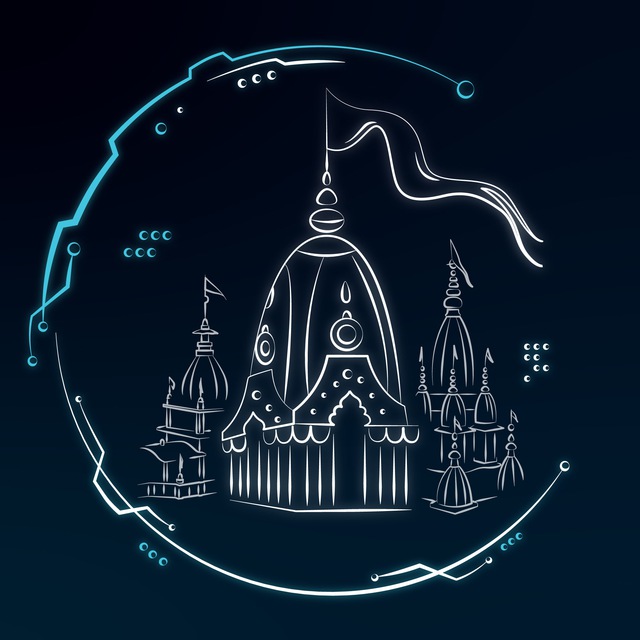Киртаны с участием Шрилы Шридхара Махараджа и Шрилы Говинды Махараджа 1982.02.13.A
His Divine Grace Śrīla Bhakti Rakṣaka Śrīdhara Deva Goswāmī Mahārāja
82.02.13.A
Śrīla Govinda Mahārāja: [Leading singing ? – 1:38]
Śrīla Śrīdhara Mahārāja: Emona durmmati, saṁsāra bhitare.
Śrīla Govinda Mahārāja:
(1)
emona durmati, saṁsāra bhitore, poḍiyā āchinu ām
i tava nija-jana, kono mahājane, pāṭhāiyā dile tumi
(2)
doyā kori’ more, patita dekhiyā, kohilo āmāre giyā
ohe dīna-jana, śuno bhālo kathā, ullasita ha’be hiyā
(3)
tomāre tārite, śrī-kṛṣṇa-caitanya, navadwīpe avatār
tomā heno koto, dīna hīna jane, korilena bhava-pār
(4)
vedera pratijñā, rākhibāra tare, rukma-varna vipra-suta
mahāprabhu nāme, nadīyā mātāya, saṅge bhāi avadhūta
(5)
nanda-suta jini, caitanya gosāi, nija-nāma kori’ dān
tārilo jagat, tumi-o jāiyā, loho nija-paritrān
(6)
se kathā śuniyā, āsiyāchi, nātha! tomāra caraṇa-tale
bhakativinoda, kāṅdiyā kāṅdiyā, āpana-kāhinī bole
[1) O Lord! With such a wicked mind as this I have fallen into the material world, but You have sent one of Your pure and elevated devotees to rescue me. 2) He saw me so fallen and wretched, took pity, and came to me saying, “O humbled soul, please listen to this good tiding, for it will gladden your heart. 3) Śrī Kṛṣṇa Caitanya has appeared in the land of Navadvīpa in order to deliver you. He has safely conducted many miserable souls such as you across the sea of worldly existence. 4) To fulfil the promise of the Vedas, the son of a brāhmana, of golden complexion and bearing the name of Mahāprabhu, has descended along with His brother, the avadhūta Nityānanda. Together They have overwhelmed all of Nadīyā with divine ecstasy. 5) Śrī Caitanya Gosāi, who is Kṛṣṇa Himself, the son of Nanda, has saved the world by freely distributing the gift of His own holy name. Go to Him also and receive your deliverance.” 6) Hearing those words, O Lord, Bhaktivinoda has come weeping and weeping to the soles of Your lotus feet and tells the story of his life.] [Dainyātmikā, by Śrīla Bhaktivinoda Ṭhākura]
Śrīla Śrīdhara Mahārāja: __________ Kṛpā-bindu diyā, gurudeva! kṛpā-bindu diyā.
Śrīla Govinda Mahārāja: ____________________________ Nimāi.
Nimāi [?]:
(1)
gurudev! kṛpā-bindu diyā, koro’ ei dāse, tṛṇāpekṣā ati hīna
sakala sahane, bala diyā koro’, nija-māne spṛhā-hīna
(2)
sakale sammāna, korite śakati, deho’ nātha! Jathājatha
tabe to’ gāibo, hari-nāma-sukhe,, aparādha ha’be hata
(3)
kabe heno kṛpā, labhiyā e jana, kṛtārtha hoibe, nātha!
śakti-buddhi-hīna, āmi ati dīna, koro’ more ātma-sātha
(4)
yogyatā-vicāre, kichu nāhi pāi, tomāra karuṇā—sāra
karuṇā nā hoile, kāṅdiyā kāṅdiyā, prāṇa nā rākhibo āra
[1) O Gurudeva! By administering a drop of your mercy make this servant of yours infinitely more humble than a blade of grass. Giving me the strength to bear all trials and troubles, free me from desires for personal honour. 2) O lord and master! Inspire me with the power to befittingly honour all living beings. Only then will I sing the holy name of the Lord in great ecstasy, and my offensive activities will cease. 3) When will this person be indeed blessed by receiving your mercy, O lord and master? Devoid of all strength and intelligence, I am very low and fallen. Please make me your own. 4) When I examine myself for worthiness, I find nothing of value. Therefore Your mercy is the essence of life. If you are not merciful to me, then I will constantly weep and weep, no longer being able to maintain my life.] [Gurudeva, by Śrīla Bhaktivinoda Ṭhākura]
Śrīla Śrīdhara Mahārāja: Sarvasva tomār, caraṇe saṁpiyā.
Śrīla Govinda Mahārāja: ____________ sarvasva tomār, caraṇe saṁpiyā __________ [?]
Śrīla Śrīdhara Mahārāja:
(1)
sarvasva tomār, caraṇe saṁpiyā, poḍechi tomāra ghare
tumi to’ ṭhākur, tomāra kukur, boliyā jānaho more
(2)
bāṅdhiyā nikaṭe, āmāre pālibe, rohibo tomāra dwāre
pratīpa-janere, āsite nā dibo, rākhibo gaḍera pāre
(3)
tava nija-jana, prasād seviyā, ucchiṣṭa rākhibe jāhā
āmāra bhojan, parama-ānande, prati-din ha’be tāhā
(4)
bosiyā śuiyā, tomāra caraṇa, cintibo satata āmi
nācite nācite, nikaṭe jāibo, jakhona ḍākibe tumi
(5)
nijera poṣana, kabhu nā bhāvibo, rohibo bhāvera bhore
bhakativinoda, tomāre pālaka, boliyā varaṇa kore
[1) Now that I have surrendered all that I possess unto Your lotus feet, I throw myself down before Your house. You are the master of the house; kindly consider me Your own dog. 2) Chaining me nearby, You will maintain me, and I shall lie at Your doorstep. I will not allow Your enemies to enter, but will keep them outside the bounds of the surrounding moat. 3) Whatever food remnants Your devotees leave behind after honouring Your prasāda will be my daily sustenance. I will feast on those remnants in great bliss. 4) While sitting up or lying down, I will constantly meditate on Your lotus feet. Whenever You call, I will immediately run to You and dance in rapture. 5) I will never think for my own nourishment, and will remain absorbed in ever cherishing love for my Master. Bhaktivinoda now accepts You as his only maintainer.] [From Śrīla Bhaktivinoda Ṭhākura’s, Śaraṇāgati, Goptṛtve-varaṇa, 4]
____________________________________________ [?]
Śrīla Govinda Mahārāja: __________________ [?]
jayore jayore jaya, paramahaṁsa mahāśaya, śrī bhaktisiddhānta saraswatī
goswāmī ṭhākura jaya, parama karuṇāmaya, dīnahīna agatira gaṭi
nīlācale haiyā udaya, śrī gauḍamaṇḍale āsi’
prema bhakti parakāśi, jivera nāśilā bhava-bhaya
tomāra mahimā gāi, hena sādhya mora nāi, tabe pāri yadi deho śakti
viśvahite avirata, ācāra-pracāre rata, viśuddha śrī rūpānugā bhakti
jāni āmi mahāśaya, yaśovāñchā nāhi haya, vindu mātra tomāra antare
tava guṇa vīṇādhārī, mora kaṇṭha-vīṇā dhari’…
Śrīla Śrīdhara Mahārāja: Śrī gauḍamaṇḍala bhūmi, bhakta saṅge parikrami.
Śrīla Govinda Mahārāja: Śrī gauḍamaṇḍala bhūmi, bhakta saṅge parikrami, sukītti sthāpilā mahāśaya.
Śrīla Śrīdhara Mahārāja: Kuliyāte pāyaṇḍīrā, atyācāra kaila yā’rā.
Śrīla Govinda Mahārāja: Kuliyāte pāyaṇḍīrā, atyācāra kaila yā’rā.
Śrīla Śrīdhara Mahārāja: Tā savāra doṣa kṣamā karī’, jagate kaile ghoṣaṇā, ‘taroriva sahiṣṇunā’, hana ‘kīrttanīyaḥ sadā hariḥ. _________________________________________ [?]
Śrīla Govinda Mahārāja: ______________________________ [?]
Śrīla Śrīdhara Mahārāja: __________________________ [?] Smārttamāta jaladhara.
Śrīla Govinda Mahārāja:
smārttamāta jaladhara, śuddha bhakti rabi-kara, ācchādila bhāviyā antare
śāstra sindhu manthanete, susiddhānta jhañjhāvāte, uḍāilā dig digantare sthāne
sthāne kata maṭha, sthāpiyācha niṣkapaṭa, prema sevā śikhāite jive
maṭhera vaiṣṇava gaṇa, sadā kore vitaraṇa, hari guṇa-kathāmṛta bhave
śuddha-bhakti-mandākinī, vimala pravāha āni, śītala karilā taptaprāṇa
deśe deśe niṣkiñcana, prerilā vaiṣṇava gaṇa, vistārite hariguṇa gāna
pūrvve yathā gaura hari, māyāvāda cheda kari, vaiṣṇava karilā kāśīvāsī
vaiṣṇava darśana-sukṣma, vicāre tumi he dakṣa, temati toṣilā vārāṇasī
śrī pāṭ khetari dhāma, ṭhākura śrī narottama, tomāte tāṅhāra guṇa dekhi
śāstrera siddhānta-sāra, śuni lāge camatkāra, kutā kika dite nāra phāṅki
śuddha bhakti-mata yata, upadharmma-kavalita, heriyā lokera mane trāsa
hāni’ susiddhānta-vāṇa, upadharmma khāna khāna, saj janera vāḍāle ullāsa
daivavarṇāśrama-dharmma, hari bhakti yāra marmma, śāstra yukte karilā-niścaya
jñāna-yoga-karmma caya, mulya tāra kichu naya, bhaktira virodhi yadi haya
śrī viśvavaiṣṇava-rāja, sabhāmadhye ‘pātrarāja’, upādhi-bhūṣaṇe vibhūyita
viśvera maṅgala lāgi’, haiyācha sarvva tyāgī, viśvavāśī jana-hite rata
karitecha upakāra, yāte para upakāra, labhe jīva śrī kṛṣṇa-sevāya
dūre yāya bhava-roga, khaṇḍe yāhe karma bhoga, hari pāda padma yā’te pāya
jīva moha-nidrā gata, jāgā’te vaikuṇṭha dūta, ‘gauḍīya’ pāṭhāo ghare ghare
uṭhare uṭhare bhāi, āra ta samaya nāi, ‘kṛṣṇa bhaja’ bole uccaisvare
tomāra mukhāra vinda, vigalita makaranda, siñcita acyuta-guṇagāthā
śunile juḍāya prāṇa, tamo moha antarddhāna, dūre yāya hṛdayera vyathā
jāni āmi mahāśaya, yaśovāñchā nāhi haya, vindu mātra tomāra antare
tave guṇa vīṇādhārī, mora kanṭḥa-vīṇā dhari’, avaśete valāya āmāre
vaiṣṇavera guṇa-gāna, karile jīvera trāṇa, suniyāchi sādhu guru mukhe
kṛṣṇa bhakti samudaya, janama saphala haya, e bhava-sāgara tare sukhe
te-kāraṇe prayāsa, yathā rāmanera āśa, gaganera cāṅda dhari vāre
adoṣa-daraśī tumi, adhama patita āmi, nija guṇe kṣamivā āmāre
śrī gaurāṅga-pāriṣada, ṭhākura bhaktivinoda, dīnahīna patitera bandhu
kalitamaḥ vināśite, ānilena avanīte, toma’ akalaṅka pūrṇa indu
kora kṛpā vitaraṇa, premasudhā anukṣaṇa, mātiyā uṭhuka jīva gaṇa
harināma-saṁkīrttane, nācuka jagata-jane, vaiṣṇava-dāsera nivedana
harināma-saṁkīrttane, nācuka jagata-jane,
harināma-saṁkīrttane, nācuka jagata-jane,
harināma-saṁkīrttane, nācuka jagata-jane,
Haribol, Haribol, Haribol, Haribol,
Nitai Gaura Haribol, Haribol, Haribol, Haribol,
Nitai Gaura Haribol, Haribol, Haribol, Haribol
[Ācāryya-vandanā, From Kīrttan Guide, 4th Edition, p 11-13]
[No English verse translation available here]
Śrīla Śrīdhara Mahārāja: _____________________________________ [?]
Śrīla Govinda Mahārāja: _____________________________________ [?]
(1)
bhayabhañjana-jayaśaṁsana-karuṇāyatanayanam
kanakotpala janakojjvala-rasasāgara-cayanam
mukharīkṛta-dharaṇītala-harikīrtana-rasanam
kṣitipāvana-bhavatāraṇa-pihitāruṇa-vasanam
śubhadodaya-divase vṛṣaravijā-nija-dayitam
praṇamāmi ca caraṇāntika-paricāraka-sahitam
(2)
śaraṇāgata-bhajanavrata-cirapālana-caraṇam
sukṛtālaya-saralāśaya-sujanākhila-varaṇam
harisādhana-kṛtabādhana janaśāsana-kalanam
sacarācara-karuṇākara-nikhilāśiva-dalanam
śubhadodaya-divase vṛṣaravijā-nija-dayitam
praṇamāmi ca caraṇāntika-paricāraka-sahitam
(3)
atilaukika-gatitaulika-ratikautuka-vapuṣam
atidaivata-mativaiṣṇava-yati-vaibhava-puruṣam
sasanātana-raghurūpaka-paramāṇugacaritam
suvicāraka iva jīvaka iti sādhubhiruditam
śubhadodaya-divase vṛṣaravijā-nija-dayitam
praṇamāmi ca caraṇāntika-paricāraka-sahitam
(4)
sarasītaṭa-sukhadoṭaja-nikaṭapriyabhajanam
lalitāmukha-lalanākula-paramādarayajanam
vrajakānana-bahumānana-kamalapriyanayanam
guṇamañjari-garimā-guṇa-harivāsanavayanam
śubhadodaya-divase vṛṣaravijā-nija-dayitam
praṇamāmi ca caraṇāntika-paricāraka-sahitam
(5)
vimalotsavam amalotkala-puruṣottama-jananam
patitoddhṛti-karuṇāstṛti-kṛtanūtana-pulinam
mathurāpura-puruṣottama-samagaurapuraṭanam
harikāmaka-haridhāmaka-harināmaka-raṭanam
śubhadodaya-divase vṛṣaravijā-nija-dayitam
praṇamāmi ca caraṇāntika-paricāraka-sahitam
[1) He (of divine form) came forth from the birthplace of the golden lotus — the ocean of the mellow of divine consorthood. His large, merciful eyes dispel (the suffering souls’) fear and proclaim (the surrendered souls’) victory. His tongue (constantly) vibrates the whole Earth planet with Śrī Kṛṣṇa saṅkīrtana, his beauty resplendent in the robes of the Sun’s radiance (saffron) that purifies the universe and dispels the suffering of material existence. On his Holy Day of Advent, I (again and again) bow down unto that beloved associate of Śrī Vṛṣabhānunandinī, and the servitors of his lotus feet.
2) The devotees surrendered in pure devotion are eternally protected at his lotus feet. He is worshippable by the pure souls endowed with sincerity and good fortune, and he accepts (even) those who obstruct the service of Śrī Hari, just to rectify them. As the very fountainhead of mercy upon all mobile and immobile beings, he crushes the inauspiciousness of the whole universe. On his Holy Day of Advent, I (again and again) bow down unto that beloved associate of Śrī Vṛṣabhānunandinī, and the servitors of his lotus feet.
3) Like a miracle, his body moves with a joyful elegance and charm beyond the world’s understanding, fulfilling the artist’s aspiration. (Or, dancing in pastimes transcendental to the world, his artistic form incites divine love’s hankering). His intellect surpasses that of (even) the demigods, and he is nobility incarnate as the commander in-chief of the Vaiṣṇava sannyāsīs (tridaṇḍi-yatis). The sādhus of profound intellect describe the nature of his personality as meticulously in the line of Śrī Sanātana, Śrī Rūpa, and Śrī Raghunātha, and they speak of him as being on the same plane as Śrī Jīvapāda (being superbly replete in perfect theistic conclusions). On his Holy Day of Advent, I (again and again) bow down unto that beloved associate of Śrī Vṛṣabhānunandinī, and the servitors of his lotus feet.
4) On the bank of Śrī Rādhā Kuṇḍa at Svānanda Sukhada Kuñja, he is devoted to the service of his Beloved, and (furthermore) he is greatly endeared to the divine damsels of Vraja headed by Lalitā. He is most favourite to Kamala Mañjarī who is pre-eminent in Vṛndāvana, and with the glorious qualities of Guṇa Mañjarī he builds the residence of Śrī Hari. On his Holy Day of Advent, I (again and again) bow down unto that beloved associate of Sri Vṛṣabhānunandinī, and the servitors of his lotus feet.
5) He is immaculate joy incarnate, or, he is the graciousness or the joy of Vimalā Devī. He manifested the pastimes of his Advent at Puruṣottama Kṣetra in the holy land of Orissa, and he revealed his pastimes of delivering the fallen souls and extending his mercy upon them (by awarding them the gift of divine love) at the ‘new isles,’ or Navadvīpa. Circumambulating Gaura Dhāma in the same way as traditionally done at Vraja Dhāma and Puruṣottama Dhāma, he continuously propagates — the loving desire of Vraja, the divine abode of Vaikuṇṭha, and the holy name of Kṛṣṇa. On his Day of Holy Advent, I (again and again) make my obeisance unto that dear associate of Śrī Vṛṣabhānunandinī, and the servitors of his holy lotus feet.] [Śrī-Dayita-dāsa-praṇati-pañcakam, Homage unto Śrī Dayita Dāsa]
[Śrī Śrī Prapanna-jīvanāmṛtam, p 216-218]
Śrīla Śrīdhara Mahārāja: Kabe gaura-vane.
Śrīla Govinda Mahārāja:
(1)
kabe gaura-vane, suradhunī-taṭe, `hā rādhe hā kṛṣṇa’ bole’
kāṅdiyā beḍā’bo, deho-sukha chāḍi’, nānā latā-taru-tale
(2)
śwa-paca-gṛhete, māgiyā khāibo, pibo saraswatī-jala
puline puline, gaḍā-gaḍi dibo, kori’ kṛṣṇa-kolāhala
(3)
dhāma-bāsī jane, pranati koriyā, māgibo kṛpāra leśa
vaiṣṇava-caraṇa- reṇu gāya mākhi’, dhori’ avadhūta-veśa
(4)
gauḍa-braja-jane, bheda nā dekhibo, hoibo baraja-bāsī
dhāmera swarūpa, sphuribe nayane, hoibo rādhāra dāsī
[1) When will I wander weeping under the shade of various trees and creepers on the banks of the celestial Gaṅgā River in the land of Navadvīpa, crying, “O Rādhe! O Kṛṣṇa!” and forgetting all physical comforts? 2) I will take my meals by begging at the homes of dog-eaters, and will drink the water of the Sarasvatī River. In ecstasy I will roll on the ground from bank to bank of the river, raising an uproar of “Kṛṣṇa! Kṛṣṇa!” 3) Bowing down to the inhabitants of the holy land, I will beg a particle of their mercy. I will smear the dust of the Vaiṣṇavas’ feet all over my body and wear the dress of a mendicant. 4) I will see no difference between the inhabitants of Vraja Bhūmi and those of Navadvīpa, and I will be transformed into a resident of Vraja. The true nature of the Lord’s abode will manifest itself to my eyes, and I will become a maidservant of Śrīmatī Rādhārāṇī.] [Siddhi-lālasā, by Śrīla Bhaktivinoda Ṭhākura] & [Kīrttan Guide, 4th Edition, p 60-1]
Śrīla Śrīdhara Mahārāja:
śrī-rūpa-mañjarī-pada sei mora sampada,
sei mora bhajana-pūjana sei mora prāṇa-dhana
sei mora abharaṇa, sei mora jīvanera jīvana
sei mora rasa-nidhi sei mora vāñchā-siddhi, sei mora vedera dharama
sei vrata, sei tapaḥ sei mora maṇtra-japa, sei mora dharama-karama
anukūla habe vidhi se pade haibe siddhi, nirakhiba e dui nayane
se-rūpa mādhurī-rāśi prāṇa-kuvalaya – śaśī, praphullita habe niśi-dine
tuyā adarśana ahi garale jarala dehi, cira-dina tāpita jīvana
hā hā prabhu kara dayā deha more pada-chāyā, narottama laila śaraṇa
[Śrī-rūpa-mañjarī-pada]
[“The divine lotus feet and shelter of Śrī Rūpa Mañjarī are my ever cherished invaluable wealth and object of my devotional service and worship. They are the treasure of my heart that adorns my existence and they are the life of my life. They are the infinite reservoir of all transcendental mellows and the perfection that fulfils all my desires. They are the conclusion of the esoteric meaning of the Vedas for me. They are the goal of my vows, austerity, maṇtras and meditation. They are the purpose of my inner divine existence and the spiritual activities of my soul.
I am earnestly praying that the divine will of providence will greatly favour me so I may maintain perfection in the pure loving service of her lotus feet. At that moment the moon like beauty and radiance of Śrī Rūpa Mañjarī will appear before my eyes captivating and bathing the lotus of my heart with rays of ecstasy constantly day and night. My heart burns afflicted by the venomous bite of separation from such a beautiful life of fulfilment. I am in such desperate need therefore, O my divine mistress Śrī Rūpa Mañjarī, please shower your ambrosial mercy upon me, soothe me, and embrace me in the shade of your lotus feet. Narottama dāsa takes complete shelter of you.”] [Prathana Lalasa, 16, by Narottama Dāsa Ṭhākura]
Hare Kṛṣṇa Hare Kṛṣṇa Kṛṣṇa Kṛṣṇa Hare Hare
Hare Rāma Hare Rāma Rāma Rāma Hare Hare
Nitāi Gaura Haribol Haribol Haribol Haribol
Nitāi Gaura Haribol Haribol Haribol Haribol
Nitāi Gaura Haribol Haribol Haribol Haribol
Nitāi Gaura Haribol Haribol Haribol Haribol
Jaya oṁ viṣṇupāda śrī śrīmad bhakti siddhānta saraswatī goswāmī prabhupāda kī jaya!
Devotees: Jaya!
Śrīla Śrīdhara Mahārāja: Jaya tadīya mahāvir bhavasan mahotsav kī!
Devotees: Jaya!
Śrīla Śrīdhara Mahārāja: Jaya parikara vṛnda kī jaya!
Devotees: Jaya!
Śrīla Śrīdhara Mahārāja: Jay ācārya vṛnda kī jaya!
Devotees: Jaya!
Śrīla Śrīdhara Mahārāja: Harināma saṅkīrtana kī jaya!
Devotees: Jaya!
Śrīla Śrīdhara Mahārāja: Chaitanya Maṭha kī jaya!
Devotees: Jaya!
Śrīla Śrīdhara Mahārāja: Govinda Sāraswat Maṭha kī jaya!
Devotees: Jaya!
Śrīla Śrīdhara Mahārāja: Śākha Maṭha samo kī jaya!
Devotees: Jaya!
Śrīla Śrīdhara Mahārāja: Bhakta-vṛnda kī jaya!
Devotees: Jaya!
Śrīla Śrīdhara Mahārāja: Gaura Haribol. Gaura Haribol.
Devotee: Jaya oṁ viṣṇupāda paramahaṁsa-parivrājakācārya aṣṭottara-śata-śrī śrīmad bhakti rakṣak śrīdhar dev-goswāmī mahārāja kī jaya!
Devotees: Jaya!
Devotee: Jagad guru śrīla śrīdhar dev-goswāmī mahārāja kī jaya!
Devotees: Jaya!
Śrīla Śrīdhara Mahārāja:
nāma-śreṣṭhaṁ manum api śacī-putram atra svarūpaṁ
rūpaṁ tasyāgrajam uru-purīṁ māthurīṁ goṣṭavāṭīm
rādhā-kuṇḍaṁ giri-varam aho rādhikā-mādhavāśāṁ
prāpto yasya prathita-kṛpayā śrī guruṁ taṁ nato ‘smi
[Śrīla Raghunātha Dāsa Goswāmī prays: “I only aspire after one thing. I cherish the hope that one day I may be welcomed into the plane where Rādhikā and Mādhava are in Their glory, sitting and playing.”]
vāñchā-kalpatarubhyaś ca kṛpā-sindhubhya eva ca patitānāṁ
pāvanebhyo vaiṣṇavebhyo namo namaḥ
[I offer my respectful obeisances unto all the Vaiṣṇava devotees of the Lord. They are just like desire trees who can fulfil the desires of everyone, and they are full of compassion for the fallen conditioned souls.]
namo mahā-vadānyāya kṛṣṇa-prema-pradāya te
kṛṣṇaya kṛṣṇa-caitanya-nāmne gaura-tviṣe namaḥ
[I offer praṇāma unto Śrī Caitanya Mahāprabhu, who is Kṛṣṇa Himself. He has assumed the golden hue of Śrīmatī Rādhikā and is munificently distributing Kṛṣṇa prema.]
The English version of text is taken from www.scsmathglobal.com










































































































































